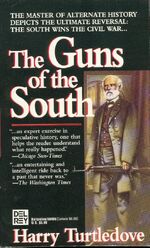| ||||||||||||||||||||||||||||||
James Andrew Seddon (July 13, 1815 - August 19, 1880) is best remembered to history for being one of the men who served as Secretary of War of the Confederate States (1862-1865) during the American Civil War.
James Seddon was born in Falmouth, Virginia, on July 13, 1815. After graduating from the University of Virginia in 1835 he was admitted to the bar and practiced law in Richmond.
A member of the Democratic Party, Seddon was elected to the U.S. Congress and served for two spells (4 March 1845-3 March 1847 and 4 March 1849-3 March 1851).
Seddon was a member of the peace convention held in Washington, DC in 1861 that attempted to devise a means of preventing the American Civil War. Seddon also attended the Provisional Confederate Congress in 1861. President Jefferson Davis appointed Seddon as his Secretary of War in November 1862 and he held the position until January 1865.
When the United States Army arrived in Andersonville, Georgia in May 1865, photographs of the prisoners were taken and the following month they appeared in Harper's Weekly. The photographs caused considerable anger and calls were made for the people responsible to be punished for these crimes. It was eventually decided to charge Seddon, General Robert E. Lee, and several other Confederate generals and politicians with "conspiring to injure the health and destroy the lives of United States soldiers held as prisoners by the Confederate States". In August 1865, President Andrew Johnson ordered that the charges against Seddon and the Confederate generals and politicians should be dropped.
James Seddon died in Goochland County on August 19, 1880.
James Seddon in The Guns of the South[]
James Seddon was the Secretary of War of the Confederate States when the C.S. was given the AK-47, which allowed the C.S. to win the Second American Revolution.
In 1864, Seddon joined President Jefferson Davis and General Robert E. Lee at a meeting where Seddon and Davis were briefed by Lee on the usefulness of the new AK-47. Seddon arrived late to the meeting due to his assumption that the unreliable rail service would delay Lee's arrival. However, he did arrive shortly after Davis complained to Lee of his absence and so the meeting proceeded.[1]
President Davis opened by indicating General Joseph Johnston had written him praising the new rifles. General Lee responded that if anything reports understated the quality of the guns. He indicated that the repeaters were robust, reasonably accurate and they and their ammunition were available in sufficient quantities to take to the field in the spring. Seddon asked and was delighted to learn that the AK-47s were giving the Confederates the advantage in the war of attrition which the Revolution was becoming.[2]
Davis expressed satisfaction that this would let the CS avoid more desperate measures that some senior officers were advocating. After swearing both to secrecy, Davis described General Patrick Cleburne's as-yet secret proposal to liberate and arm male Negro slaves. Seddon, having previously read Cleburne's memorandum, indicated grave concern over this and the controversy it would surely cause. He too indicated his hope that the AK-47s would prevent the need for such desperate measures.[3]
Lee then described the mysterious origins of the guns. The town of Rivington, North Carolina was not a manufacturing town and the weapons had gunsmiths' marks for the People's Republic of China, Yugoslavia, and the SSSR, which seemed to be foreign places but could not be found on maps. Seddon suggested that this indicated Rivington was a transshipment point rather than where they were made. Lee agreed that it did appear to be so but that there was no indication of how the weapons were being smuggled into Rivington. The blockade runners were not bringing the guns in at Wilmington. The guns seemed to originate in the town and then were shipped to his Army and other Confederate forces. Seddon suggested to Davis that they send men to observe Rivington and learn what they might. Davis ordered Seddon to see to it.[4]
After the successful campaign by Lee in 1864 ended in an armistice, Seddon stayed on as Secretary of War while the peace treaty was negotiated and the subsequent plebiscite held. General Lee returned to Richmond and remained commanding general until 1866 when he submitted his resignation in person to Seddon. Seddon asked why and was informed by Lee that in order to fulfil his full responsibilities to the CSA, he must do so as a civilian. Seddon indicated he had heard rumors that Lee intended to run for President but had not presumed on their acquaintanceship to ask directly. He also expressed his confidence in the future of the CSA being in Lee's hands.[5]
A short while later, Seddon forwarded to Lee Nathan Bedford Forrest's letter of resignation from the CS Army. The letter indicated Forrest's intention to run against Lee in the upcoming election. Lee had been aware of the displeasure the men of America Will Break had with his views on emancipation and concluded that they would support Forrest.[6]
After Lee won election to the Presidency, Seddon did not stay on as head of the War Department. He stepped aside when Lee filled the position with Jefferson Davis. Lee had never held Seddon in especially high regard.
See also[]
- James of Seddon Dun: An analog of Seddon in The War Between the Provinces.
References[]
| Political offices (OTL) | ||
|---|---|---|
| Preceded by George W. Randolph |
Secretary of War for the Confederate States 1862-1865 |
Succeeded by John Breckinridge |
| Political offices (The Guns of the South) | ||
| Preceded by George W. Randolph |
Secretary of War for the Confederate States 1862-1868 |
Succeeded by Jefferson Davis |
| |||||||||||||||||||

